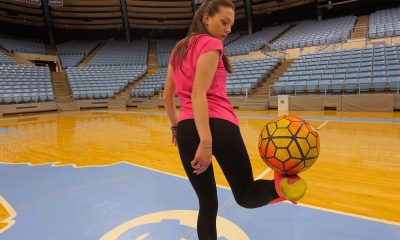Health
Mozzies may be carrying Japanese encephalitis this summer. Here’s what to know if you’re spending time outdoors
There’s no widespread dengue, yellow fever or malaria. But there are still many viruses that local mosquitoes can spread. Despite predictions of a rare mid-summer return of La Niña, there’s still speculation about what this means for temperature and rainfall. We may not see flooding, but there is still likely to be enough water around […]
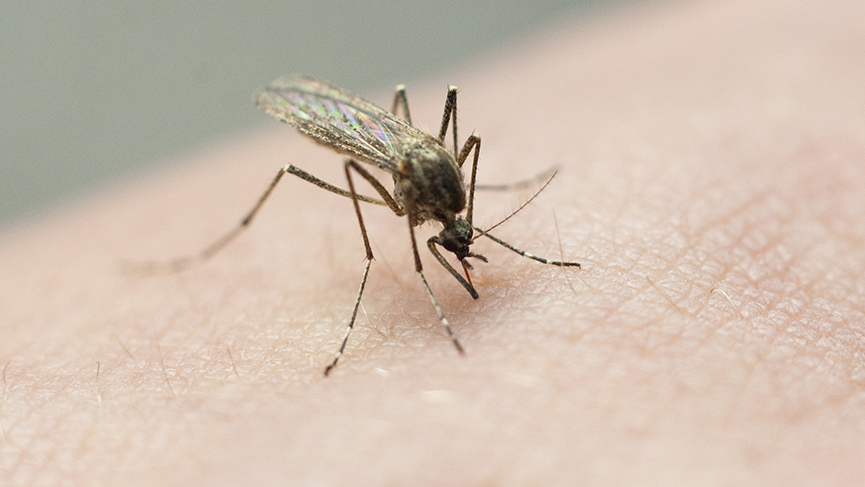

There’s no widespread dengue, yellow fever or malaria. But there are still many viruses that local mosquitoes can spread.
Despite predictions of a rare mid-summer return of La Niña, there’s still speculation about what this means for temperature and rainfall. We may not see flooding, but there is still likely to be enough water around for mosquitoes.
After its unexpected arrival, it now seems Japanese encephalitis virus is here to stay. But how this virus interacts with local mosquitoes and wildlife, under the influence of increasing unpredictable climatic conditions, requires more research.
Mosquito-borne diseases in Australia
You can get better protection by also covering up with a long-sleeved shirt, long pants, and covered shoes.
Japanese encephalitis virus was initially discovered in southeastern Australia during the summer of 2021–22, and the boom in mosquito and waterbird populations that followed flooding at the time contributed to its spread.
Meanwhile, Murray Valley encephalitis virus has been detected in sentinel chicken flocks – which health authorities use to test for increased mosquito-borne disease risk – in NSW and in the Kimberley region of Western Australia.
Some regions of Australia may have experienced flooding, but for many regions of the country, conditions have been hot and dry. This is bad news for mosquitoes.
About 5,000 cases of mosquito-borne disease are reported in Australia each year. The vast majority of these are due to Ross River virus. The disease this virus causes is not fatal, though it can be severely debilitating.
This summer, Japanese encephalitis virus has been detected in mosquitoes and feral pigs in NSW. The virus has also been detected in environmental surveillance in northern Victoria, and we know at least one person has been affected there.
In the summer of 2023–24, hot and dry summer conditions returned, mosquito numbers declined, and the number of cases of disease caused by Japanese encephalitis virus and Murray Valley encephalitis dropped.

A/Prof Cameron Webb/NSW Health Pathology
The influence of weather patterns
So why are Japanese encephalitis virus and Murray Valley encephalitis virus active again when the conditions appear to be less favourable?
Outbreaks in southeastern Australia often accompany flooding brought on by La Niña weather patterns. Floods provide ideal conditions for mosquitoes, as well as the waterbirds that harbour the virus.
The symptoms of human disease caused by these two viruses are similar.
Japanese encephalitis virus is closely related to Murray Valley encephalitis virus. Mosquitoes pick up both viruses by biting waterbirds. But Japanese encephalitis virus has only recently become widespread in Australia.
So what is Japanese encephalitis, and how can you protect yourself and your family if you live, work or are holidaying in mosquito-prone regions this summer?
It’s unusual to see activity of these viruses when conditions are relatively dry and mosquito numbers relatively low.
After flooding rains brought on by La Niña in 2020, conditions that persisted for three years, Murray Valley encephalitis virus returned and Japanese encephalitis virus arrived for the first time.
Wherever you live, mosquito bite prevention is key. Apply insect repellent when outdoors, especially during dawn and dusk when mosquitoes are most active or at any time of the day if you’re in bushland or wetland areas where numbers of mosquitoes may be high.
Additional deaths have been reported due to Murray Valley encephalitis in recent years – two each in Western Australia and the Northern Territory.
What’s different this summer?
There also isn’t any evidence of more waterbird activity. In fact, numbers have declined in recent years.
For Japanese encephalitis virus, it may be that feral pigs are playing a more important role in its spread. We know numbers are on the rise and with drier conditions, perhaps mosquitoes and feral pigs, and other wildlife, are gathering together where they can find bodies of water.
The public health alerts in Victoria and NSW focus especially on specific regions in northern Victoria and around Griffith and Narromine in NSW where the virus has been detected.
There’s no specific treatment for either disease, though there is a vaccine for Japanese encephalitis which may be appropriate for certain people at high risk (more on that later).
Most people infected show no symptoms. In mild cases, there may be fever, headache and vomiting. In more serious cases, people may experience neck stiffness, disorientation, drowsiness and seizures. Serious illness can have lifelong neurological complications and, in some cases, the disease is life-threatening.
There have been around 80 cases of disease caused by these two viruses combined over the past four years. This includes seven deaths due to Japanese encephalitis across Queensland, NSW, South Australia and Victoria.
Now both viruses appear to be back. So what’s going on?
This news comes after both Victoria and New South Wales issued public health alerts in recent weeks warning about the virus.
There is no evidence that mosquito numbers are booming like they did back when La Niña brought floods to the Murray-Darling Basin.
But there is no vaccine available for Murray Valley encephalitis or Ross River viruses.
How can you reduce your risk this summer?
Relative to other parts of the world, Australia has traditionally been very low risk for potentially life-threatening mosquito-borne diseases.
A Victorian man is reportedly in a critical condition in hospital after contracting Japanese encephalitis from a mosquito bite.
Disease caused by two other pathogens, Japanese encephalitis virus and Murray Valley encephalitis virus, are much rarer but potentially fatal.
If you live or work in areas at risk of Japanese encephalitis, seek advice from your local health authority to see if you are eligible for vaccination. Residents in specified local government areas in affected regions in both states are currently eligible for a free vaccine.
Murray Valley encephalitis virus has been known in Australia for many decades. After a significant outbreak across the Murray Darling Basin region in 1974, activity has generally been limited to northern Australia.
Health
Lexington County athletes medal at SCHSL track and field championships
By Jacob Phillips The track season has ended for athletes in Lexington County following the conclusion of the South Carolina high School League track and field championships. Over the course of three days, athletes from all over South Carolina traveled to Spring Valley or Richland Northeast High School for the state championships. The best-of-the-best came […]


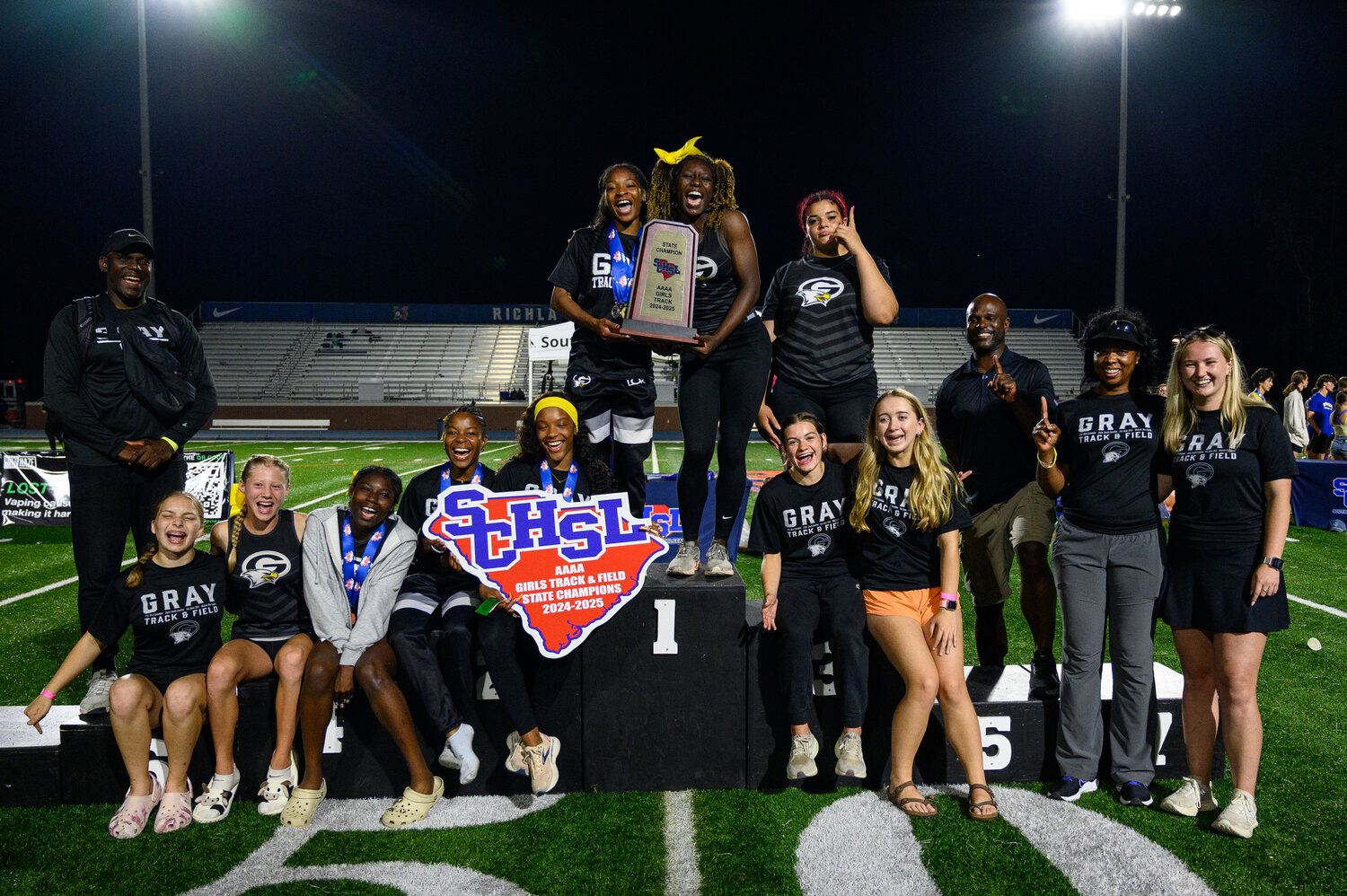
The track season has ended for athletes in Lexington County following the conclusion of the South Carolina high School League track and field championships.
Over the course of three days, athletes from all over South Carolina traveled to Spring Valley or Richland Northeast High School for the state championships. The best-of-the-best came together to compete head to head for gold in various track and field events.
Each classification had its own meet. Two meets were held each day with one at each host site.
In all, 43 Lexington County athletes left with a gold, silver or bronze medal. Many others finished in the top-eight to earn a spot on the expanded podium.
Nine different athletes won a gold medal, and one program scored enough points to win the overall team championship.
Gray Collegiate’s girls team won its second-consecutive state title, and first in 4A, after scoring 61 points. The War Eagles finished three points ahead of Daniel to win the championship.
The War Eagle girls were propelled to first place thanks in part to an excellent showing from Tamara Steward. She finished the day with four medals, two gold, one silver and one bronze.
Steward was on the track and in the field, finishing first in the girls 100m hurdles and long jump. She got a silver medal in the girls 400m hurdles and a bronze in the 4x100m relay.
Taylor Jones, Aliyah Edwards and Zaria Gaines won a bronze medal as Steward’s relay teammates.
Steward was not the only athlete to win multiple medals at the games. Her teammate Tresta Miller won two silvers in the 100-meter and 400-meter races.
Gray’s Damarcus Gaither won three medals in the boys events, claiming first in the 200-meter run and 4×100-meter relay and second in the 400.
Brookland-Cayce’s Aden Price won three medals, finishing first in the 400-meter race, third in the 100-meter and third in the 4×400-meter relay.
In the 2A meet, a pair of Batesburg-Leesville athletes double-medaled in field events. Keira Frye won gold in the girls discus and shot put, while Ja’Quan Corleyearned bronze and silver in the same boys events.
The state title meets mark the end of the high school track season in South Carolina. Some of the state’s top athletes will get the chance to keep running at national events early this summer.
Below is a list of all the local athletes who medaled and what event they won it in.
Lexington County athletes to medal
5A Division I
Kendra Miles – Lexington – 2nd girls 1600m
Ciara Williams – Lexington – 2nd girls long jump
Josh Voegele – Lexington – 3rd boys 1600m
TyRon Ray – River Bluff – 3rd boys high jump
Patton Casto – River bluff – 3rd girls shot put
Tyler Brown – Dutch Fork – 3rd boys 4x800m relay
Evan DeMasi – Dutch Fork – 3rd boys 4x800m relay
Eli Johnson – Dutch Fork – 3rd boys 4x800m relay
Owen Warner – Dutch Fork – 3rd boys 4x800m relay
5A Division II
Nyla Fair – White Knoll – 2nd 100m hurdles
Summit Wood – Chapin – 3rd boys 3200m
Reagan Trevett – Chapin – 3rd girls 800m
McKenzie Lindler – Chapin – 3rd girls pole vault
Reagan Trevett – Chapin – 3rd girls 4x800m relay
Lilly Holman – Chapin – 3rd girls 4x800m relay
Jacqueline Bonavilla – Chapin – 3rd girls 4x800m relay
Addison Houmiel – Chapin – 3rd girls 4x800m relay
4A
Damarcus Gaither – Gray Collegiate – 1st boys 200m, 1st boys 4x100m relay, 2nd boys 400m
Kayden Garvin – Gray Collegiate – 1st boys 4x100m relay
Caleb Raysor – Gray Collegiate – 1st boys 4x100m relay
David Quattlebaum – Gray Collegiate – 1st boys 4x100m relay
Tamara Steward – Gray Collegiate – 1st girls 100m hurdles, 1st girls long jump, 2nd girls 400m hurdles, 3rd girls 4x100m relay
Taylor Jones – Gray Collegiate – 3rd girls 4x100m relay
Aliyah Edwards – Gray Collegiate – 3rd girls 4x100m relay
Zaria Gaines- Gray Collegiate – 3rd girls 4x100m relay
Tresta Miller – Gray Collegiate – 2nd girls 100m, 2nd girls 400m
DeAndre Jones – Brookland-Cayce – 1st boys high jump
Aden Price – Brookland-Cayce – 1st boys 400m, 3rd boys 100m, 3rd boys 4x400m relay
Isaiah Daniels – Brookland-Cayce – 3rd boys 4x400m relay
D’andre Dunbar – Brookland-Cayce – 3rd boys 4x400m relay
Jaylen Glover – Brookland-Cayce – 3rd boys 4x400m relay
London Paige – Brookalnd-Cayce – 3rd girls high jump
Aaliyrah Culbreath – Airport – 2nd girls long jump
Amari Lewis – Airport – 3rd boys 4x100m relay
Kyree Montgomery – Airport – 3rd boys 4x100m relay
Kendrick Pearson – Airport – 3rd boys 4x100m relay
Terrance Bolden – Airport – 3rd boys 4x100m relay
3A
Aza Shelby – Swansea – 3rd girls 100m hurdles, 3rd girls 400m hurdles
2A
Madison Kyzer – Pelion – 1st – girls javelin
Corey Campbell – Pelion – 2nd boys pole vault
Johnathan Davis – Pelion – 3rd boys 100m
Keira Frye – Batesburg-Leesville – 1st girls shot put, 1st girls discus
Ja’Quan Corley – Batesburg-Leesville – 2nd boys shot put, 3rd boys discus
Health
Mental health awareness with “Beyond the Stigma” panel for Harris County employees
In honor of Mental Health Awareness Month, County Judge Lina Hidalgo hosted a panel discussion, Beyond the Stigma, for County workers to learn about the mental health resources and support available to them. Hidalgo was joined by healthcare experts and two former Texans football players who shared their personal stories about mental health. “Really surrounding […]



In honor of Mental Health Awareness Month, County Judge Lina Hidalgo hosted a panel discussion, Beyond the Stigma, for County workers to learn about the mental health resources and support available to them.
Hidalgo was joined by healthcare experts and two former Texans football players who shared their personal stories about mental health.
“Really surrounding yourself with people that if your therapist tells you not to bother her, you can call the next person on the list,” Hidalgo said. Emphasizing the importance of building strong support networks.
Key Strategies for Mental Health Support
The panel discussion highlighted three essential approaches to mental wellness:
Building Support Network: Mental health experts emphasize the value of developing reliable support systems beyond professional therapy. These networks can include family members, friends, trusted colleagues, or teachers who provide crucial emotional support during challenging times.
Ongoing Health Management Project: Dr. Quianta Moore, Executive Director of The Hackett Center for Mental Health, stressed that mental healthcare deserves the same attention as physical health. “If you go to your primary care doctor, they should be asking you questions around your mental health,” Moore said.
She emphasized that mental health management is an ongoing process, encouraging individuals to explore different therapeutic approaches until finding the most effective treatment.
Breaking Stigmas: Former Houston Texans player Owen Daniels addressed common misconceptions about mental health, particularly among men and athletes. “For me is to share that, to help destigmatize this mental health specifically for men, for athletes… For people that might seem like they have it all together and that they don’t have anything to have mental health issues about,” Daniels said.
Available Resources for County Employees
Harris County has implemented comprehensive mental health support services for its workforce, including:
-
Four onsite mental health clinicians
-
Peer support programs
-
Mental health awareness training
-
Specialized resources and educational materials
Judge Hidalgo’s Leadership Through Example
Hidalgo’s openness about her 2023 leave of absence for mental health treatment has resonated throughout the county workforce. Her transparency demonstrates that seeking mental health support represents strength rather than weakness, challenging long-standing stigmas around mental health care.
The county’s initiative aligns with broader national efforts to normalize mental health discussions in the workplace and ensure accessible support services for employees.
Health
Girls' golf swings their way to 6th in state
With hard work, skill and a whole lot of drive, the Staples girls’ golf team climbed their way up to sixth in the state. So, what is this dream team’s secret to their victories and success? Well, the team heavily focuses on and caters to the mental health of all team members, taking many mental […]
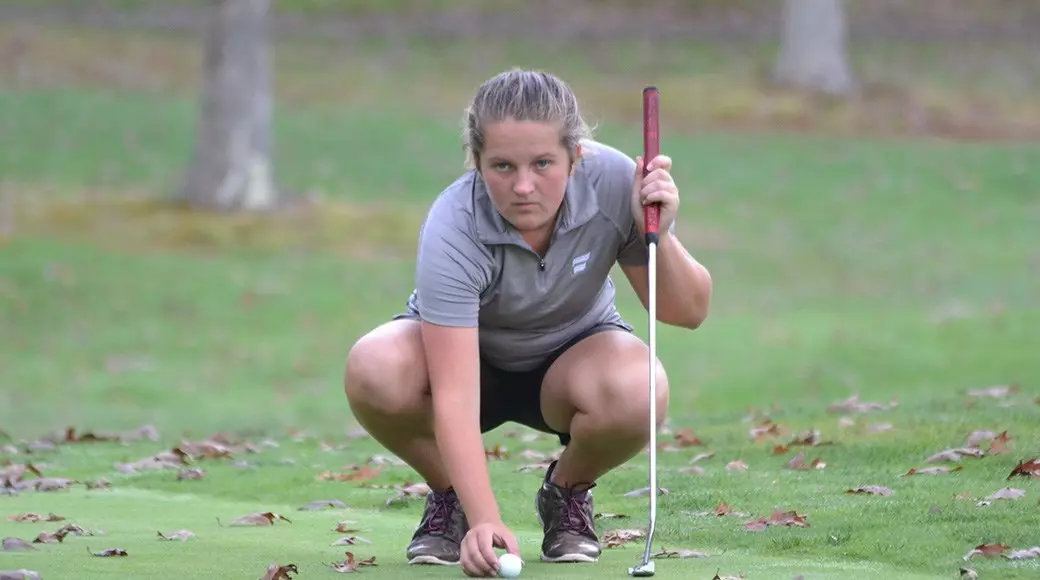


With hard work, skill and a whole lot of drive, the Staples girls’ golf team climbed their way up to sixth in the state.
So, what is this dream team’s secret to their victories and success? Well, the team heavily focuses on and caters to the mental health of all team members, taking many mental health classes throughout the season. A sharp mind is the key to the team’s success.
“Our team worked towards this ranking by staying positive,” Lucy Hill ’27 said. “We practice not only on the course, but also off the course with mental health classes to keep a good mindset since golf is a very mental sport.”
Mental performance coach Rhodie Lorenz leads these mental health classes frequently.
“It’s easy to get overwhelmed with the sport and to let one bad shot affect the rest of the hole,” team captain Lauren Clementi ’25 said, “but having our mindset changed by these mental health classes has definitely helped us.”
The team has tough competition, but overall, their positive attitudes keep them smiling and having a good time, win or lose. Their captains – Clementi, Aviva Ross ’25, Rachel Pontoriero ’25 and Katelynn Mitchell ’26 – work to create a fun and stress-free atmosphere for the players.
“I’d say we’re a pretty positive team,” Clementi said. “We like to have fun and we don’t take everything too seriously, which creates an environment where we are able to have fun. I think that’s why we have such a large team.”
This year the team has gotten increasingly more popular, accumulating a total of 28 players on JV and eight players on varsity.
Staples sports are taken seriously, so being an athlete can get pretty intense and stressful, especially while being a member of the varsity team. However, the girls’ golf team seems to have nailed the perfect balance between hard work and fun.
Health
Minnesota gymnasts embrace mental health to capture national title at Oklahoma
Elle Mueller and Lily Pederson led Oklahoma to a national gymnastics title, emphasizing mental health. MINNESOTA, USA — For gymnasts, athletic success is often defined by strength, precision and discipline. But for two Minnesota natives now competing at the University of Oklahoma, the path to a national championship was shaped just as much by mental […]
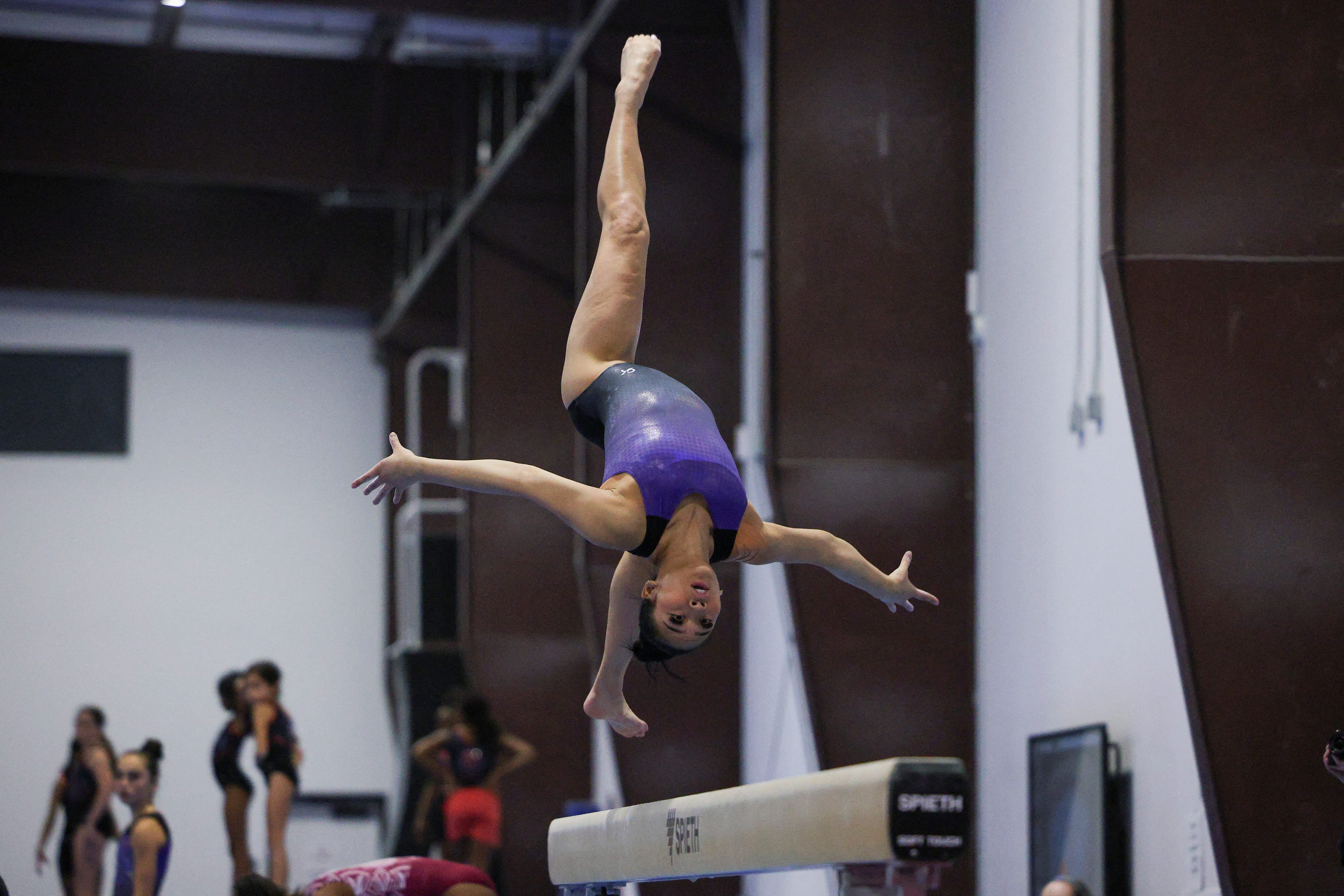
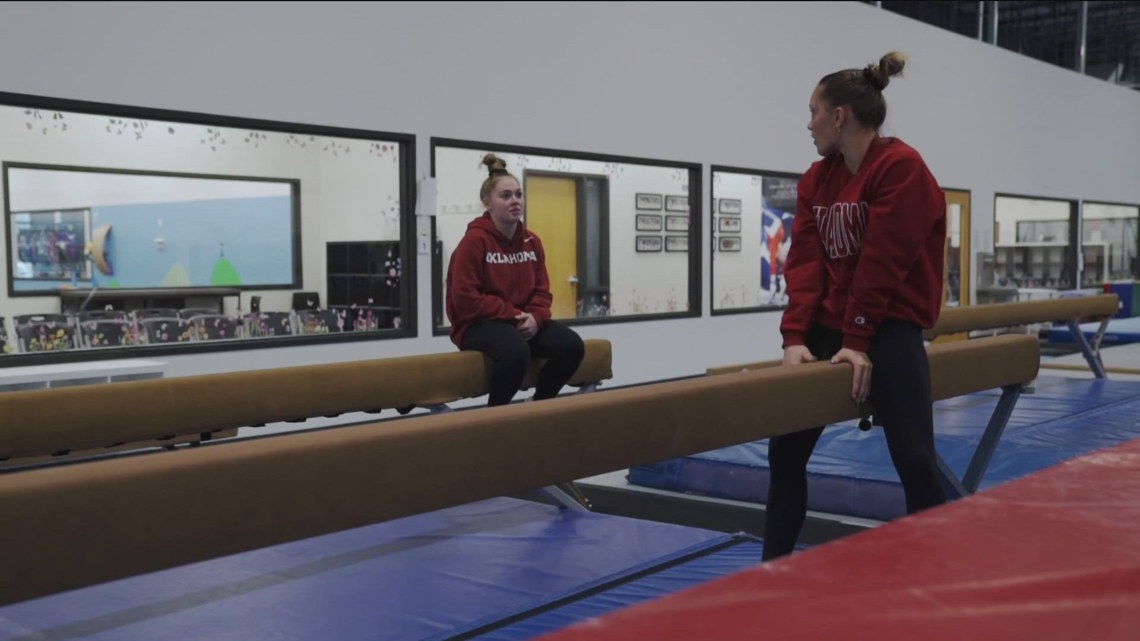
Elle Mueller and Lily Pederson led Oklahoma to a national gymnastics title, emphasizing mental health.
MINNESOTA, USA — For gymnasts, athletic success is often defined by strength, precision and discipline. But for two Minnesota natives now competing at the University of Oklahoma, the path to a national championship was shaped just as much by mental resilience as physical training.
Elle Mueller, from Blaine, and Lily Pederson, from White Bear Lake, have been in leotards since they were toddlers. Once competitors, the two became teammates this year at Oklahoma, where they helped lead the Sooners to a national gymnastics title in 2025.
“It’s always been my dream to do college gymnastics,” Pederson said. “To actually be here now — I don’t ever want to stop.”
Mueller, who once competed for Team USA alongside future Olympians, was on an elite track throughout high school. She took online classes to accommodate her intense training schedule, but in her senior year, she made the difficult decision to step away from elite competition — a move driven by her need to prioritize mental health.
“I would do my routines for my coaches, not for myself,” Mueller said. “I’ve learned to do things out of love, for myself — and to finally have confidence in who I am.”
Her mother said she could sense the emotional toll gymnastics was taking.
“I wasn’t going to tell her she needed to change,” she said. “But I knew she was hurting. I knew she wasn’t happy. When she finally said she wanted to step back, I was so thankful.”
Mueller and Pederson’s willingness to prioritize mental well-being reflects a broader shift in the culture of elite sports — a shift catalyzed, in part, by Olympic legend Simone Biles. At the Tokyo Olympics in 2021, Biles stunned the world by pulling herself from competition after experiencing the “twisties,” a dangerous loss of air awareness. Her openness about mental health struggles helped dismantle long-standing stigmas in the gymnastics community and beyond.
“I think I’ve found my confidence,” Mueller said. “Just to do everything for myself, from a place of love — that’s something I didn’t have before.”
Pederson shared a similar path — one marked by stepping away from pressure and stepping into her own identity as an athlete and person.
“Getting to do this all together, makes it better,” Pederson said.
As the two prepare to return to Oklahoma for another season, both athletes say they’re not just following a path — they’re owning it.
“Mental health matters,” Mueller said. “Don’t push it under the rug. You have to take care of it.”
If you or someone you know is struggling with mental health, help is available:
-
National Suicide & Crisis Lifeline: Dial 988 — free, 24/7, confidential support for people in distress.
-
The Trevor Project (for LGBTQ+ youth): Call 1-866-488-7386 or text ‘START’ to 678-678.
-
NCAA Mental Health Resources: www.ncaa.org/sport-science-institute/mental-health
-
Athletes for Hope: Offers mental health resources for athletes at all levels — www.athletesforhope.org
Health
Transgender athlete's win at suburban middle school track meet sparks heated debate
Debate over a transgender student’s win in a suburban middle school girls track meet grew heated at a school board meeting Monday. The track meet took place at Jefferson Middle School in Naperville, where the student athlete won multiple events, becoming a microcosm of a national debate over trans athletes in sports. During public comment […]



Debate over a transgender student’s win in a suburban middle school girls track meet grew heated at a school board meeting Monday.
The track meet took place at Jefferson Middle School in Naperville, where the student athlete won multiple events, becoming a microcosm of a national debate over trans athletes in sports.
During public comment at a Naperville Community Unit School District 203 Board meeting Monday, nearly 100 parents could be seen in the audience, some raising transgender pride flags, others holding signs that read “Protect Girls Sports” and “Stop Exploiting Kids.”
At one point, an audience member could be heard shouting “Protect trans youth” before being escorted out of the meeting.
Parents opposed to the student’s participation in the meet have asked for federal funds to be frozen at District 203 until the board changes course on its athletics policies, arguing they are in violation of Title IX.
Title IX is a federal law that prohibits sex-based discrimination in education programs and activities that receive federal funds.
Awake Illinois, a non profit organization advocating against gender-affirming care for kids, filed a federal civil rights complaint against the district over the meet.
Parents who spoke in the meeting argued the student’s participation “creates an unfair playing field for our daughters” while others expressed support for the school’s inclusive policy.
Illinois’ Human Rights Act prohibits discrimination based on gender identity in educational settings in the state.
“Transgender, nonbinary, and gender nonconforming students often face barriers to participation in school athletics and other gender-based activities. Physical education, school sports teams, and school clubs are considered ‘facilities, goods and services’ under the Act and students are entitled to participate in these activities free from discrimination based on sex, sexual orientation, or gender-related identity,” the Illinois Department of Human Rights stated, adding that “students cannot be prevented from access to, full participation in, or the equal enjoyment of extracurricular activities due to their gender-related identity.”
In a statement, District 203 said it is “committed to protecting the privacy of all students.”
“In accordance with the Family Educational Rights and Privacy Act (FERPA) and district policy, we cannot and will not share personal or identifiable information about any student without appropriate consent,” the statement read. “In regards to our procedures, Naperville 203 adheres to the Illinois Human Rights Act and the Illinois State Board of Education guidance, which prohibit discrimination in schools and ensure full and equal access to programs and services regardless of gender identity or other protected characteristics.”
No action was taken at the meeting Monday.
“The initial reaction to start filing court cases with the Department of Justice and turn a 13-year-old or a 12-year-old’s life into a spectacle…that’s just not a very humane thing to be doing,” Kristal Larson with the LGBTQ Center in Grayslake told NBC Chicago.
Larson noted that a child’s ability to participate in sports is pivotal to their mental health.
Dr. Kelsey Leonardsmith, who treats transgender children from several states at the Family Tree Clinic in Minneapolis, and is a professor at the University of Minnesota Medical School, said transgender girls and women are already underrepresented in sports and make up just a tiny percentage of student athletes. She disputed the contention of critics that allowing them to participate in girls sports gives them unfair advantages and puts other girls in physical danger.
“Shutting out trans girls helps no one, and it is profoundly harmful to those it excludes,” Leonardsmith said. “On the surface, it removes opportunities for physical activity, for fitness, for belonging. But on a more fundamental level, it says to trans youth, ‘We do not believe you, you are not real,’ and it is hard to imagine a more damaging message to send to children.”
Cases of transgender athletes in women sports have been at the center of nationwide debates since President Donald Trump took office.
In 2022, the NCAA used a sport-by-sport approach to allow transgender athletes to participate, deferring to an individual sport’s national governing organization, international federation or prior established International Olympic Committee criteria.
The NCAA changed its policy the day after Trump signed an executive order on Feb. 5 that was intended to ban transgender athletes from competing in girls and women’s sports. That ended its sport-by-sport practice in favor of a blanket policy that only allows athletes assigned female at birth to participate in women’s sports.
The Illinois High School Association “allows participation by students consistent with their gender identity subject to applicable federal and state laws,” though they have urged state officials to communicate with federal authorities to “provide clear direction.”
The Education Department has already opened reviews of San Jose State University volleyball, Denver Public Schools, Portland Public Schools, Oregon School Activities Association and the Massachusetts Interscholastic Athletic Association, among others.
The Associated Press contributed to this report.
Health
BYU women's basketball guard injures ACL twice
Many people look up to athletes, but people hardly talk about the challenges they go through. Arielle Mackey-Williams tells her story of how her injury impacted her life and mental health. “There’s been a lot of nights where I’m at home trying to go to sleep and I’m just crying myself to sleep because it […]
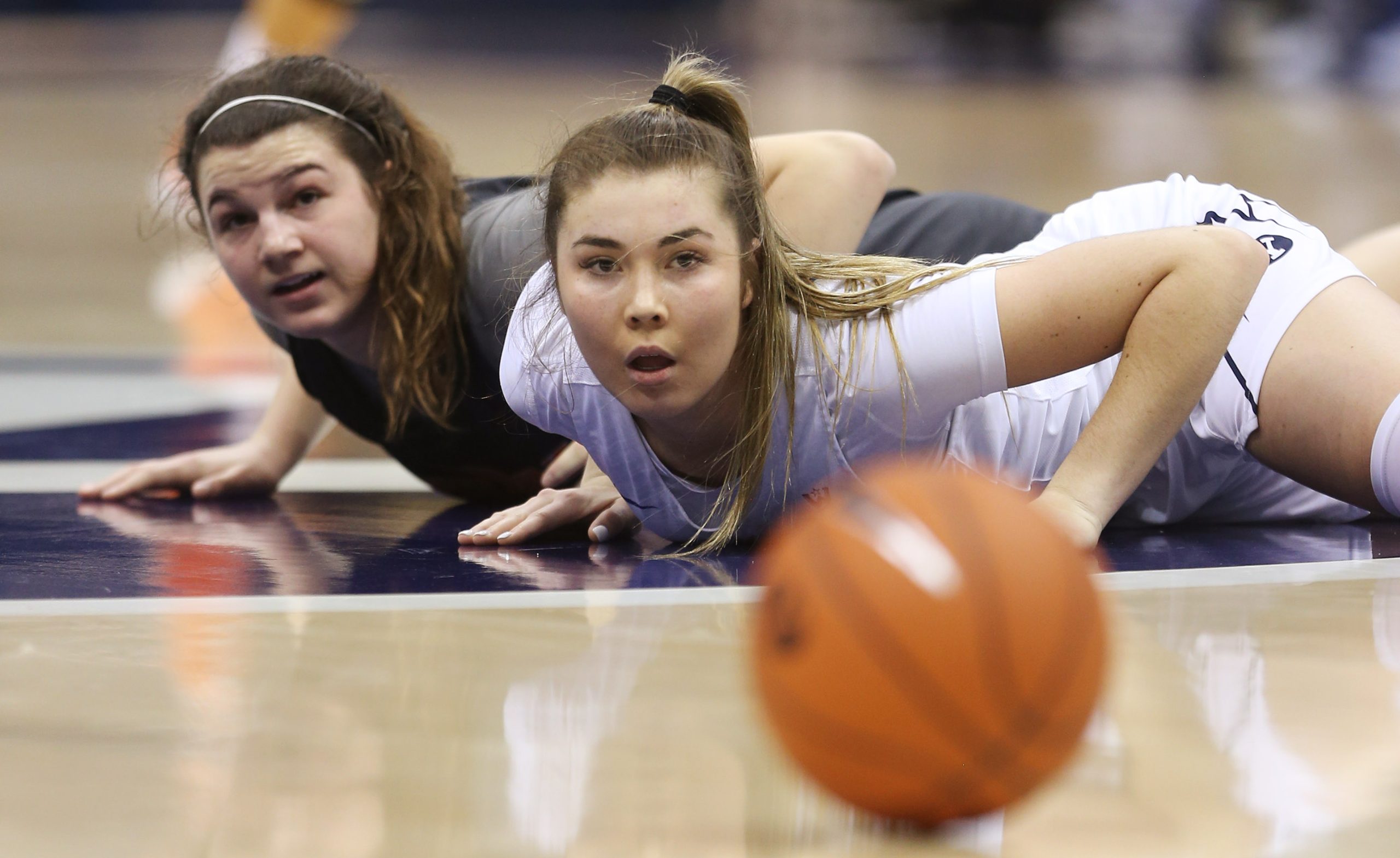

Many people look up to athletes, but people hardly talk about the challenges they go through.
Arielle Mackey-Williams tells her story of how her injury impacted her life and mental health.
“There’s been a lot of nights where I’m at home trying to go to sleep and I’m just crying myself to sleep because it just really hurts,” Mackey-Williams said.
10% of college athletes experience severe injuries according to the national athletic trainers association.
This is the second time that BYU women’s basketball player Arielle Mackey-Williams has injured her ACL. It has kept her from playing in another season.
“My first ACL injury, I went in to do a backdoor cut and my leg went inwards,” Mackey Williams-said. “The second time I definitely knew I tore my ACL again.”
Mackey-Williams said that staying positive has been more challenging during her second injury.
Newly-named BYU women’s basketball head coach Lee Cummard said he saw the mental toll the injury took on Mackey-Williams.
“On the court, Ari is a fierce competitor,” Cummard said. “The second time around, you can see it wearing on her a little bit more.”
Others close to her, including her mother and former coach, Mary Dawn described her firsthand experience.
“The hardest thing was, I couldn’t simply hug her and let her cry out loud and embrace that pain,” Dawn said.
BYU’s assistant athletic director of clinical mental health, Holly Binks, said athletes face tough challenges physically and mentally when they are dealing with an injury.
“There has to be almost a mourning period where they have to have grief, because they’ve had like a loss of like dreams of playing,“ Binks said.
Binks said that injuries are more than just a physical setback, they can impact scholarships and grades.
Binks and Cummard said that the sports culture is evolving to include a greater focus on mental health.
“Having a optimistic but a real point of view of where they’re at will really help,” Cummard said.
Dawn offered advice on how parents of athletes can support their mental health.
“Be a source of emotional support,” Dawn said. “Validate the feelings and remind them it’s okay to feel upset.”
Mackey-Williams said she has grown throughout her mental health journey.
“I think my injuries helped me just to be more grateful for knowing not only just basketball, but just the little things in life,” Mackey-Williams said.
Mackey-Williams said she has been able to maintain her mental health through this challenge while finding joy in the little things in life.
-

 Fashion3 weeks ago
Fashion3 weeks agoHow to watch Avalanche vs. Stars Game 7 FREE stream today
-

 High School Sports2 weeks ago
High School Sports2 weeks agoWeb exclusive
-
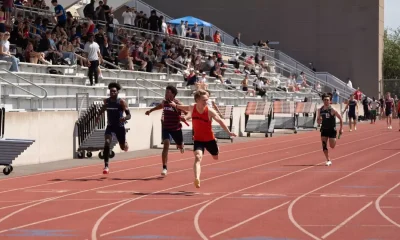
 Sports2 weeks ago
Sports2 weeks agoPrinceton University
-
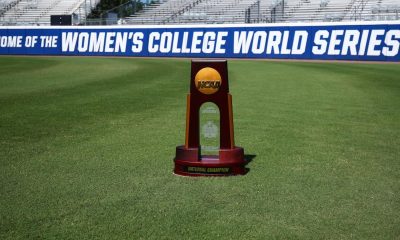
 Sports2 weeks ago
Sports2 weeks ago2025 NCAA softball bracket: Women’s College World Series scores, schedule
-

 Motorsports2 weeks ago
Motorsports2 weeks agoBowman Gray is the site of NASCAR’S “Advance Auto Parts Night at the Races” this Saturday
-
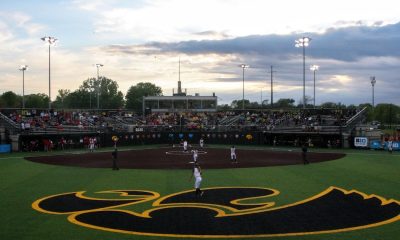
 NIL2 weeks ago
NIL2 weeks ago2025 Big Ten Softball Tournament Bracket: Updated matchups, scores, schedule
-
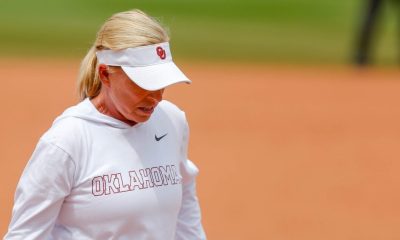
 NIL2 weeks ago
NIL2 weeks agoPatty Gasso confirms Sophia Bordi will not finish season with Oklahoma softball
-

 Motorsports2 weeks ago
Motorsports2 weeks agoMOTORSPORTS: Three local track set to open this week | Sports
-

 Motorsports2 weeks ago
Motorsports2 weeks ago$1.5 Billion Legal Powerhouse Announces Multi-Year NASCAR Deal With Kyle Busch
-
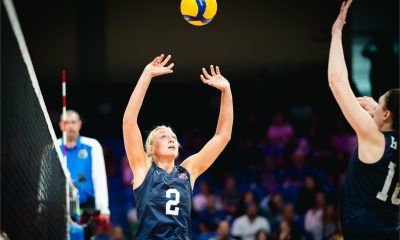
 Sports2 weeks ago
Sports2 weeks agoUSA Volleyball Announces 2025 Women’s VNL Roster














